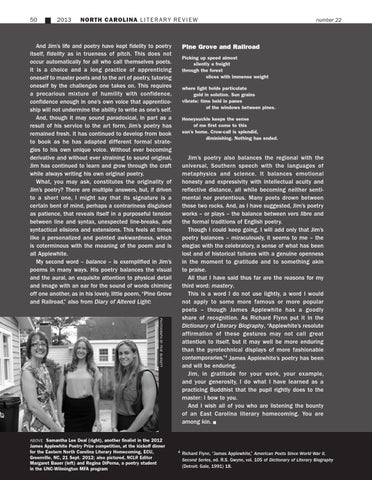50
2013
NORTH CAROLINA L I T E R A R Y RE V I E W
And Jim’s life and poetry have kept fidelity to poetry itself, fidelity as in trueness of pitch. This does not occur automatically for all who call themselves poets. It is a choice and a long practice of apprenticing oneself to master poets and to the art of poetry, tutoring oneself by the challenges one takes on. This requires a precarious mixture of humility with confidence, confidence enough in one’s own voice that apprenticeship will not undermine the ability to write as one’s self. And, though it may sound paradoxical, in part as a result of his service to the art form, Jim’s poetry has remained fresh. It has continued to develop from book to book as he has adapted different formal strategies to his own unique voice. Without ever becoming derivative and without ever straining to sound original, Jim has continued to learn and grow through the craft while always writing his own original poetry. What, you may ask, constitutes the originality of Jim’s poetry? There are multiple answers, but, if driven to a short one, I might say that its signature is a certain bent of mind, perhaps a contrariness disguised as patience, that reveals itself in a purposeful tension between line and syntax, unexpected line-breaks, and syntactical elisions and extensions. This feels at times like a personalized and pointed awkwardness, which is coterminous with the meaning of the poem and is all Applewhite. My second word – balance – is exemplified in Jim’s poems in many ways. His poetry balances the visual and the aural, an exquisite attention to physical detail and image with an ear for the sound of words chiming off one another, as in his lovely, little poem, “Pine Grove and Railroad,” also from Diary of Altered Light:
number 22
Pine Grove and Railroad Picking up speed almost silently a freight through the forest slices with immense weight where light holds particulate gold in solution. Sun grains vibrate: time held in panes of the windows between pines. Honeysuckle keeps the sense of me first come to this sun’s home. Crow-call is splendid, diminishing. Nothing has ended.
photograph by peat burnett
Jim’s poetry also balances the regional with the universal, Southern speech with the languages of metaphysics and science. It balances emotional honesty and expressivity with intellectual acuity and reflective distance, all while becoming neither sentimental nor pretentious. Many poets drown between those two rocks. And, as I have suggested, Jim’s poetry works – or plays – the balance between vers libre and the formal traditions of English poetry. Though I could keep going, I will add only that Jim’s poetry balances – miraculously, it seems to me – the elegiac with the celebratory, a sense of what has been lost and of historical failures with a genuine openness in the moment to gratitude and to something akin to praise. All that I have said thus far are the reasons for my third word: mastery. This is a word I do not use lightly, a word I would not apply to some more famous or more popular poets – though James Applewhite has a goodly share of recognition. As Richard Flynn put it in the Dictionary of Literary Biography, “Applewhite’s resolute affirmation of these gestures may not call great attention to itself, but it may well be more enduring than the pyrotechnical displays of more fashionable contemporaries.”4 James Applewhite’s poetry has been and will be enduring. Jim, in gratitude for your work, your example, and your generosity, I do what I have learned as a practicing Buddhist that the pupil rightly does to the master: I bow to you. And I wish all of you who are listening the bounty of an East Carolina literary homecoming. You are among kin. n
above Samantha Lee Deal (right), another finalist in the 2012
James Applewhite Poetry Prize competition, at the kickoff dinner for the Eastern North Carolina Literary Homecoming, ECU, Greenville, NC, 21 Sept. 2012; also pictured, NCLR Editor Margaret Bauer (left) and Regina DiPerna, a poetry student in the UNC-Wilmington MFA program
4
Richard Flynn, “James Applewhite,” American Poets Since World War II, Second Series, ed. R.S. Gwynn, vol. 105 of Dictionary of Literary Biography (Detroit: Gale, 1991) 18.
